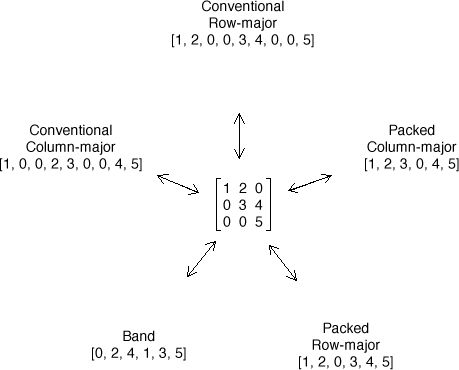MaVec is a framework for performing matrix and vector math using first-class objects. Developed after trudging through the Accelerate framework's lack of quality documentation and cryptic function names, MaVec provides a more intuitive and Objective-C friendly interface (and documentation!). But don't worry--behind many of its methods are the same Accelerate functions you've grown to know and love. Or not. Which is why MaVec is here for you.
With MaVec you can create an object from any of several array representations (conventional or packed row- or column- major, or band), with single- or double-precision floating point values, and then forget about the underlying details. It will choose the most efficient Accelerate function to perform a desired operation based on the object's characteristics (tridiagonal, symmetric, positive-definite, etc) and floating-point precision, while maintaining the most space-efficient backing store of values that you provide.
Vectors
- Addition
- Subtraction
- Multiplication (vector/scalar)
- Division
- Powers
- Dot product
- Cross product
- Triple products (vector/scalar)
- Element sum/product
- L1/L2/L3/Inifity norm
- Maximum/minimum value
- Absolute value
- Random generation
Matrices
- Addition
- Subtraction
- Multiplication
- Division
- Transpose
- Inverse
- Minors
- Cofactors
- Adjugates
- Condition numbers
- QR factorization
- LU factorization
- Singular value decomposition
- Eigendecomposition
- Symmetry queries
- Definitenes queries (positive/positive semi/negative/negative semi/indefinite)
- Trace
- L1/infinity/max/froebenius(euclidean) norm
- Column/row swaps
- Column/row extraction
- Linear system solving
- Random generation
- General
- Diagonal
- Triangular
- Symmetric
- Band
- Positive/negative/positive semi/negative semi/indefinite
Both MCMatrix and MCVector come in mutable and immutable flavors, override NSObject's equality, description and hashing methods, implement the NSCopying/NSMutableCopying protocol (so they can be inserted in Foundation collections!), and support object subscripting ([matrix valueAtRow:3 column:3] == matrix[3][3]) and debugQuickLookObject for easier debugging.
/* create some vectors and compare them */
double vectorValues[3] = { 1.0, 2.0, 3.0 };
MAVVector *vectorA = [MAVVector vectorWithValues:[NSData dataWithBytes:vectorValues length:3 * sizeof(double)]
length:3];
MAVVector *vectorB = [MAVVector vectorWithValuesInArray:@[@1.0, @2.0, @3.0]];
BOOL equal = [vectorA isEqualToVector:vectorB]; // YES
/* multiply the vectors together and do some more comparisons */
MAVMutableVector *vectorC = vectorA.mutableCopy; // NSMutableCopying
[vectorC multiplyByVector:vectorB];
equal = [vectorA isEqualToVector:vectorC]; // NO
/* vectors can be subscripted */
equal = [vectorA[0] isEqualToNumber:vectorC[0]]; // YES
equal = [vectorA[1] isEqualToNumber:vectorC[1]]; // NO
/* create some matrices and compare them */
MAVMatrix *matrix = [MAVMatrix randomSymmetricMatrixOfOrder:3 precision:MCKPrecisionDouble];
MAVMatrix *transpose = matrix.transpose.copy; // NSCopying
equal = [matrix isEqualToMatrix:transpose]; // YES
/* matrices can also be subscripted */
equal = [matrix[0][0] isEqualToNumber:transpose[0][0]]; // YES
/* multiply matrix by another matrix and then by a vector */
MAVMutableMatrix *mutableMatrix = matrix.mutableCopy; // NSMutableCopying
[mutableMatrix multiplyByMatrix:transpose];
[mutableMatrix multiplyByVector:vectorA];The MaVec way:
//
// assume an array named "values" representing a 3x3 matrix
// of either floats or doubles exists in column major format
//
MAVMatrix *matrix = [MAVMatrix matrixWithValues:[NSData dataWithBytes:values length:sizeof(values)]
rows:3
columns:3];
MAVQRFactorization *qr = matrix.qrFactorization;The Accelerate way:
//
// assume an array named "values" representing a 3x3 matrix
// of either floats or doubles exists in column major format
//
int m = 3;
int n = 3;
int lwork = -1;
int info;
if (sizeof(values) / sizeof(double) == 9) {
double *a = malloc(9 * sizeof(double));
for (int i = 0; i < 9; i++) {
a[i] = values[i];
}
int lda = m;
double *tau = malloc(MIN(m, n) * sizeof(double));
double wkopt;
dgeqrf_(&m, &n, a, &lda, tau, &wkopt, &lwork, &info);
lwork = wkopt;
double *work = malloc(lwork * sizeof(double));
dgeqrf_(&m, &n, a, &lda, tau, work, &lwork, &info);
lwork = -1;
dorgqr_(&m, &m, &n, a, &lda, tau, &wkopt, &lwork, &info);
lwork = wkopt;
free(work);
work = malloc(lwork * sizeof(double));
dorgqr_(&m, &m, &n, a, &lda, tau, work, &lwork, &info);
free(tau);
free(work);
double *q = a;
double *r = malloc(m * n * sizeof(double));
vDSP_mmulD(values, 1, a, 1, r, 1, m, n, m);
} else {
float *a = malloc(9 * sizeof(float));
for (int i = 0; i < 9; i++) {
a[i] = values[i];
}
int lda = m;
float *tau = malloc(MIN(m, n) * sizeof(float));
float wkopt;
sgeqrf_(&m, &n, a, &lda, tau, &wkopt, &lwork, &info);
lwork = wkopt;
float *work = malloc(lwork * sizeof(float));
sgeqrf_(&m, &n, a, &lda, tau, work, &lwork, &info);
lwork = -1;
sorgqr_(&m, &m, &n, a, &lda, tau, &wkopt, &lwork, &info);
lwork = wkopt;
free(work);
work = malloc(lwork * sizeof(float));
sorgqr_(&m, &m, &n, a, &lda, tau, work, &lwork, &info);
free(tau);
free(work);
float *q = a;
float *r = malloc(m * n * sizeof(float));
vDSP_mmul(values, 1, a, 1, r, 1, m, n, m);
}MaVec is a test-driven framework, where each method that is added comes with a unit test to ensure it doesn't break due to future changes. As of 5/31/2015 there are 292 test points in 85 unit tests.
- Efficient matrix chain multiplication
- Handle complex numbers
- Use entire catalog of specialized functions for a given operation based on matrix/vector characteristics (for instance, eigendecompositions of general, symmetric, triangular, tridiagonal, etc matrices all have different accelerate functions)
- Add more unit tests!
